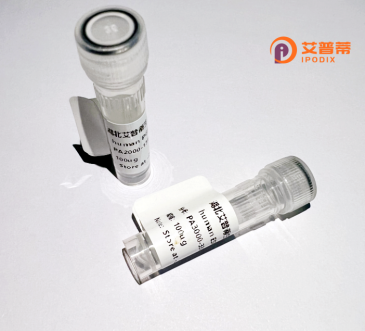
| 纯度 | >90%SDS-PAGE. |
| 种属 | Human |
| 靶点 | ATMIN |
| Uniprot No | O43313 |
| 内毒素 | < 0.01EU/μg |
| 表达宿主 | E.coli |
| 表达区间 | 1-667aa |
| 氨基酸序列 | MKMHAEKKHKCSKCSNSYGTEWDLKRHAEDCGKTFRCTCGCPYASRTALQSHIYRTGHEIPAEHRDPPSKKRKMENCAQNQKLSNKTIESLNNQPIPRPDTQELEASEIKLEPSFEDSCGSNTDKQTLTTPPRYPQKLLLPKPKVALVKLPVMQFSVMPVFVPTADSSAQPVVLGVDQGSATGAVHLMPLSVGTLILGLDSEACSLKESLPLFKIANPIAGEPISTGVQVNFGKSPSNPLQELGNTCQKNSISSINVQTDLSYASQNFIPSAQWATADSSVSSCSQTDLSFDSQVSLPISVHTQTFLPSSKVTSSIAAQTDAFMDTCFQSGGVSRETQTSGIESPTDDHVQMDQAGMCGDIFESVHSSYNVATGNIISNSLVAETVTHSLLPQNEPKTLNQDIEKSAPIINFSAQNSMLPSQNMTDNQTQTIDLLSDLENILSSNLPAQTLDHRSLLSDTNPGPDTQLPSGPAQNPGIDFDIEEFFSASNIQTQTEESELSTMTTEPVLESLDIETQTDFLLADTSAQSYGCRGNSNFLGLEMFDTQTQTDLNFFLDSSPHLPLGSILKHSSFSVSTDSSDTETQTEGVSTAKNIPALESKVQLNSTETQTMSSGFETLGSLFFTSNETQTAMDDFLLADLAWNTMESQFSSVETQTSAEPHTVSNF |
| 分子量 | 98.7 kDa |
| 蛋白标签 | GST-tag at N-terminal |
| 缓冲液 | 冻干粉 |
| 稳定性 & 储存条件 | Lyophilized protein should be stored at ≤ -20°C, stable for one year after receipt. Reconstituted protein solution can be stored at 2-8°C for 2-7 days. Aliquots of reconstituted samples are stable at ≤ -20°C for 3 months. |
| 复溶 | Always centrifuge tubes before opening.Do not mix by vortex or pipetting. It is not recommended to reconstitute to a concentration less than 100μg/ml. Dissolve the lyophilized protein in distilled water. Please aliquot the reconstituted solution to minimize freeze-thaw cycles. |
以下是关于人ATM相互作用蛋白(ATMIN) 的3篇关键文献简介:
1. **《ATMIN defines a novel subset of ATM-dependent signaling through its interaction with ATM》**
*作者:Kanu N, Behrens A*
摘要:该研究发现ATMIN是ATM激酶的关键结合蛋白,参与调控ATM在氧化应激条件下的活化,与ATM在DNA损伤反应中的经典功能存在差异,揭示了ATMIN-ATM信号通路的独立性。
2. **《ATMIN is required for ATM signaling and embryonic development in mice》**
*作者:Hurst G, et al.*
摘要:通过小鼠模型证明ATMIN对胚胎发育至关重要,ATMIN缺失导致胚胎致死,并发现其在ATM非依赖途径中调控肺分支形态发生,强调了ATMIN的多功能生理作用。
3. **《ATMIN promotes colorectal cancer by linking impaired DNA repair to tumorigenesis》**
*作者:Bharti SK, et al.*
摘要:揭示ATMIN在结直肠癌中高表达,并通过抑制同源重组修复通路(HR)导致基因组不稳定,提示其作为肿瘤治疗靶点的潜力。
*注:若需更多文献或格式调整,可补充说明研究方向或具体需求。*
ATMIN (ATM Interactor) is a protein that interacts with the ataxia-telangiectasia mutated (ATM) kinase, a central regulator of DNA damage responses. Discovered in 2004. ATMIN was initially identified as a cofactor required for ATM activation in response to oxidative stress and chromatin changes. While ATM primarily responds to double-strand DNA breaks via the MRE11-RAD50-NBS1 (MRN) complex, ATMIN facilitates ATM’s non-canonical functions during replication stress, hypoxia, or developmental processes. Structurally, ATMIN contains a zinc finger domain and a C-terminal Src homology 3 (SH3)-binding motif, enabling interactions with proteins like the transcription factor ASCIZ (also called ZNF822).
Studies in mice revealed that ATMIN is essential for embryonic development, with knockout models exhibiting lethality due to organogenesis defects, particularly in the lung and heart. Paradoxically, while ATMIN has been implicated as a tumor suppressor by regulating genome stability, some evidence suggests context-dependent oncogenic roles. Its dual regulatory functions—both cooperating with and acting independently of ATM—highlight its complexity in maintaining genomic integrity. Ongoing research explores ATMIN’s therapeutic potential in cancers and its interplay with ATR kinase in ATM-deficient contexts. Despite progress, its precise molecular mechanisms and disease relevance remain partially unresolved, warranting further investigation.
×